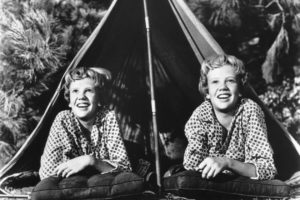Since 1876, children have looked forward to their long vacation as a time to build friendships and character.
July 23, 2020
Hello Muddah, hello Faddah,/Here I am at Camp Granada…
With more than half of the country’s 14,000 summer camps temporarily closed because of Covid-19, millions of children are missing out on experiences that have helped to shape young Americans for nearly 150 years.
I went hiking with Joe Spivey/He developed poison ivy…

Hayley Mills plays twins who meet at summer camp in ‘The Parent Trap’ (1961).
PHOTO: EVERETT COLLECTION
The idea that a spell in the great outdoors builds character has ancient roots. The Spartans practiced a particularly rigorous form: When a warrior-in-training reached the age of 12, he was sent into the wilderness for a year. Those who gave up were barred from attaining full citizenship.
And the head coach wants no sissies/ so he reads to us from something called Ulysses…
But the modern summer camp can be traced to the Transcendentalist movement of the 1830s and ‘40s. Henry David Thoreau and Ralph Waldo Emerson were ardent proselytizers for learning to live at one with nature. Their message resonated with the environmentalist Joseph T. Rothrock, who founded the country’s first sleep-away camp, the North Mountain School of Physical Culture, in 1876 near Wilkes-Barre, Pa. Rothrock believed he could take “weakly boys” from the city and rehabilitate them into healthy young men.
Ernest Balch was moved by ‘the miserable condition of boys from well-to-do families” who spent their summers living in hotels, rather than out in nature. He was still a Dartmouth College student when he founded Camp Chocorura in New Hampshire in 1881. Its emphasis on self-reliance and character-building became the blueprint for other summer camps.
You remember Jeffrey Hardy /They’re about to organize a searching party…
By 1918 there were over 1,000 in the U.S. Charles W. Eliot, a former president of Harvard, went so far as to declare in 1922 that summer camp was “the most important step in education that America has given the world.”
This would have been news to Britain, where Robert Baden-Powell, founder of the Scout movement, had been running his own summer camp since 1907. But American camps were unique in their diversity, with options for every faith and political creed. The oldest camp for Black children, Camp Atwater, was founded in North Brookfleld, Mass., in 1921, at a time when summer camping was segregated; it is still going strong today.
Take me home, oh Muddah, Faddah…
Summer camp retained a wholesome image for decades. Films such as “The Parent Trap” (1961), starring Hayley Mills as separated twin sisters who are unexpectedly reunited at a summer camp, focused on innocent fun. But darker themes were coming. The “Friday the 13th” franchise, launched in 1980, has a higher body count than many war films, with much of the carnage taking place at the fictional Camp Crystal Lake.
Wait a minute, it’s stopped hailing /Guys are swimming, guys are sailing…
But summer camps continued to grow. By the mid-2010s, according to the American Camp Association, they were an $18 billion industry serving 14 million campers every year. The disappointment of missing camp this summer will hopefully make it even more joyful to return next year. As Allan Sherman’s beloved satire concludes: Muddah, Faddah, kindly disregard this letter.





